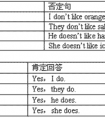用所给动词的适当形式填空。l. My father often helps my mother____(cook).2. Would you like____ (come) over to my house for dinner tomorrow evening?3. It's im-九年级英语
题文
| 用所给动词的适当形式填空。 l. My father often helps my mother____(cook). 2. Would you like____ (come) over to my house for dinner tomorrow evening? 3. It's important for us____ (learn) English well. 4. If you don't hurry,you____(be) late. |
答案
| l. (to) cook 2. to come 3. to learn 4.will he |
据专家权威分析,试题“用所给动词的适当形式填空。l. My father often helps my mothe..”主要考查你对 不定式,一般将来时 等考点的理解。关于这些考点的“档案”如下:
不定式一般将来时
考点名称:不定式
- 动词不定式:
指由to加上动词原形(而且只能是动词原形)所构成的一种非限定性动词,但在有些情况下to可以省略。
动词不定式在语法功能上可作主语、宾语、宾语补足语、表语、定语和状语。 - 动词不定式可以作以上各种成分,但它毕竟是动词,所以有动词的属性。
动词不定式及其短语还可以有自己的宾语、状语,虽然动词不定式在语法上没有表面上的直接主语,但它表达的意义是动作,这一动作一定由使动者发出。
这一使动者我们称之为逻辑主语,其形式如下:
时态 主动形式 被动形式 一般式 (not) to do (not) to be done 完成式 (not) to have done (not) to have been done 进行式 (not) to be doing 完成进行式 (not) to have been doing - 不定式的用法:
1、不定式作主语
例如:To remember this is very important.
注意:为了避免头重脚轻,在许多情况下,通常都将作主语的不定式置于句子后部,而在句首主语位置使用形式主语it。
例如:It is very important to remember this.
2、不定式作表语
例如:He seems to be ill.
注意:不定式作表语主要有三种情况,一是用于seem, appear, prove等系动词之后的不 定式(尤其是to be),
二是像My job is to sweep the floor. 这样的主语与表语“等价”的情形,
三是表示想法、约定、义务、命令、可能性、命运等,如:
You are to come when I call.
3、不定式作宾语
例如:I can not afford to buy a car.
注意:
①不定式不仅用作动词的宾语,还可用作个别介词(but, except)的宾语。
例如:I had no choice but to wait.
②当作宾语的不定式后跟有宾语补足语时,通常要用形式宾语it代替不定式,并将真正的宾语不定式置于宾语补足语之后
例如:I find it difficult to learn Japanese well.
4、不定式作宾语补足语
例如:Who taught you to drive?
5、不定式作定语
例如:I have a question to ask you.
注意:有的名词(如way, chance, right等)后用作不定式可换成of doing sth.
如:It is the best way to do (of doing) it.
但是以下名词后接不定式作定语时通常不能换成of doing sth.
attempt courage decision effort fortune failure invitation wish
6、不定式作状语
例如:I went to France to learn French.
考点名称:一般将来时
一般将来时:
表示将来某一时刻的发生动作或状态,或将来某一段时间内经常的动作或状态。
一般句型有:
肯定句:
I/We shall/will go. You/He/She/They will go.
否定句:
I/We shall/will not go. You/He/She/They will not go.
疑问句:
Shall I/we go? Will you/he/she/they go?
简略回答:
(肯)Yes,主语shall/will (否) No,主语 shall/will not
特殊疑问句:
一般将来时的特殊疑问句是将疑问词放在句首,后接一般疑问句(就主语提问时,以疑问词who开头的疑问词除外)
Why will you be here on Sunday?(周日你为什么将要在这儿?)
I will have a meeting on Sunday(我将要在周日举行一个聚会)
(对特殊疑问句要进行具体回答)
一般疑问句:
be或will提到句首,some改any,and改or,第一二人称互换
We are going to go on an outing this weekend.
Are you going to go on an outing this weekend?
被动句:
will/shall+be+v.ed(及物动词过去分词)
The letter will be sent tomorrow.
这封信明天将寄出去
We shall be punished if we break the rule.
如果我们违反规定,我们将受到惩罚。- 一般将来时的构成:
1. 用will或shall表示
“助动词will或shall+动词原形”这一形式,表示将来发生的事情,用于征求对方的意见或表示客气的邀请。在口语中will用于所有人称,书面语中第一人称常用shall,如:
①Tomorrow will be Sunday. 明天就是星期天。
②The rain will stop soon. 雨很快就要停了。
③Shall we go there at five? 我们五点钟去那儿,好吗?
④Will you please open the door? 请你把门打开,好吗?
2. 用be going to结构表示
“be going to+动词原形”用来表示近期或事先考虑过的将要发生的动作以及已有迹象 表明必将发生某事,意为“打算;就要”。如:
①We’re going to meet outside the school gate. 我们打算在校门口见面。
②Look! It's going to rain. 瞧!快下雨了。
3. 用现在进行时表示
表示位置转移的动词(如:go, come, leave, start, arrive等),可用现在进行时表示将来时。如:
①Uncle Wang is coming. 王叔叔就要来了。
②They’re leaving for Beijing. 他们即将前往北京。
4. 用一般现在时表示
根据规定或时间表预计要发生的动作,在时间和条件状语从句中,都可用一般现在时表示将来时。如:
①The new term starts (begins) on August 29th. 新学期八月二十九日开学。
②If it doesn’t rain tomorrow, we will go out for a picnic.
如果明天不下雨,我们将出去野餐。
5. 用“be+动词不定式”或用“be about to +动词原形”的结构表示,如:
①He is to visit Japan next year. 明年他将访问日本。
②They’re about to leave. (=They’re leaving.) 他们就要走了。 be going to与will的区别:
be going to与will两者都可表示将要发生的事、将要去做某事,但它们有如下几点区别:
1. be going to 表示近期、将要发生的事情,will 表示的将来的时间则较远一些,如:
He is going to write a letter tonight.
He will write a book one day.
2. be going to 表示根据主观判断将来肯定发生的事情,will表示客观上将来势必发生的事情。
He is seriously ill. He is going to die.
He will be twenty years old.
3. be going to 含有“计划,准备”的意思,而 will 则没有这个意思,如:
She is going to lend us her book.
He will be here in half an hour.
4.在有条件从句的主句中,一般不用 be going to, 而多用will, 如:
If any beasts comes at you, I'll stay with you and help you
- 最新内容
- 相关内容
- 网友推荐
- 图文推荐
| [家长教育] 孩子为什么会和父母感情疏离? (2019-07-14) |
| [教师分享] 给远方姐姐的一封信 (2018-11-07) |
| [教师分享] 伸缩门 (2018-11-07) |
| [教师分享] 回家乡 (2018-11-07) |
| [教师分享] 是风味也是人间 (2018-11-07) |
| [教师分享] 一句格言的启示 (2018-11-07) |
| [教师分享] 无规矩不成方圆 (2018-11-07) |
| [教师分享] 第十届全国教育名家论坛有感(二) (2018-11-07) |
| [教师分享] 贪玩的小狗 (2018-11-07) |
| [教师分享] 未命名文章 (2018-11-07) |


![Sunday is my birthday. I would like _____ a birthday party, would you _____to my party? [ ]A. have; come B. to have; to come C. have; to come D. to have-七年级英语](http://www.00-edu.com/d/file/ks/4/2/budingshi/2020-01-08/smalla85122db0c71d7fb6ae58187be7f1fd11578430330.png)

![Why areyou here? You are supposed ______ in the classroom now. [ ] A. to studyB. to be studiedC. studying D. to be studying -九年级英语](http://www.00-edu.com/d/file/ks/4/2/budingshi/2020-01-08/small6dee02daa62cac1c71853ac804ab4fbd1578422460.png)
![She is very poor. Little food _____ and no room _____! [ ]A. to eat, to live B. to eat, to live in C. eating, living -八年级英语](http://www.00-edu.com/d/file/ks/4/2/budingshi/2020-01-09/small17b77c2697a3ef8f1461d0d14b016ee51578585185.png)


